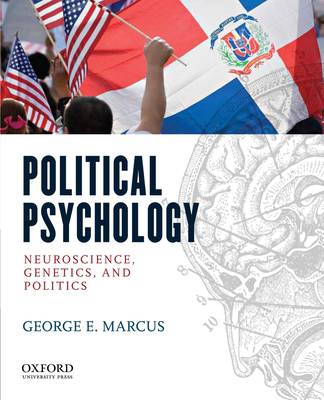
En raison d'une grêve chez bpost, votre commande pourrait être retardée. Vous avez besoin d’un livre rapidement ? Nos magasins vous accueillent à bras ouverts !
- Retrait gratuit dans votre magasin Club
- 7.000.000 titres dans notre catalogue
- Payer en toute sécurité
- Toujours un magasin près de chez vous
En raison de la grêve chez bpost, votre commande pourrait être retardée. Vous avez besoin d’un livre rapidement ? Nos magasins vous accueillent à bras ouverts !
- Retrait gratuit dans votre magasin Club
- 7.000.0000 titres dans notre catalogue
- Payer en toute sécurité
- Toujours un magasin près de chez vous
55,45 €
+ 110 points
Description
In Political Psychology: Neuroscience, Genetics, and Politics, scholar George Marcus provides a cutting-edge introduction that discusses the field's origins, evolution, and possibilities. Offering context that other texts typically omit, this unique volume includes a historical account of the ideas that underpin political psychology--ranging from Ancient Greece, through the Enlightenment, to today--thereby highlighting the deep intellectual roots and continuous vitality of the field. The book also looks at emerging trends in the discipline, integrating an "inside-out" perspective that analyzes how neuroscience, cognitive science, and genetics apply to politics. In addition to opening up new areas of inquiry, this approach gives students new conceptual, theoretical, and methodological tools that they can use to seek out new answers to old questions. An ideal text for upper-level undergraduate courses in political psychology or as a supplement in political behavior, public opinion, and political communications courses, Political Psychology focuses on teaching the essential skills involved in making credible political psychology explanations: creativity, collaboration, and critical thinking. Exercises throughout enable students to practice and master these skills and to "learn by doing."
Spécifications
Parties prenantes
- Auteur(s) :
- Editeur:
Contenu
- Nombre de pages :
- 336
- Langue:
- Anglais
Caractéristiques
- EAN:
- 9780195370645
- Date de parution :
- 24-07-12
- Format:
- Livre broché
- Format numérique:
- Trade paperback (VS)
- Dimensions :
- 180 mm x 239 mm
- Poids :
- 1179 g

Les avis
Nous publions uniquement les avis qui respectent les conditions requises. Consultez nos conditions pour les avis.






